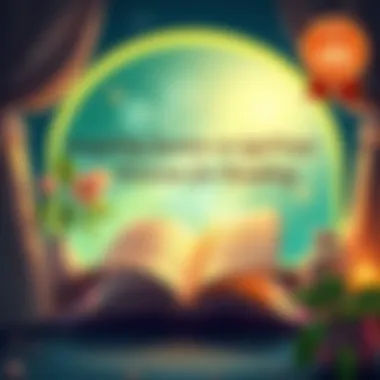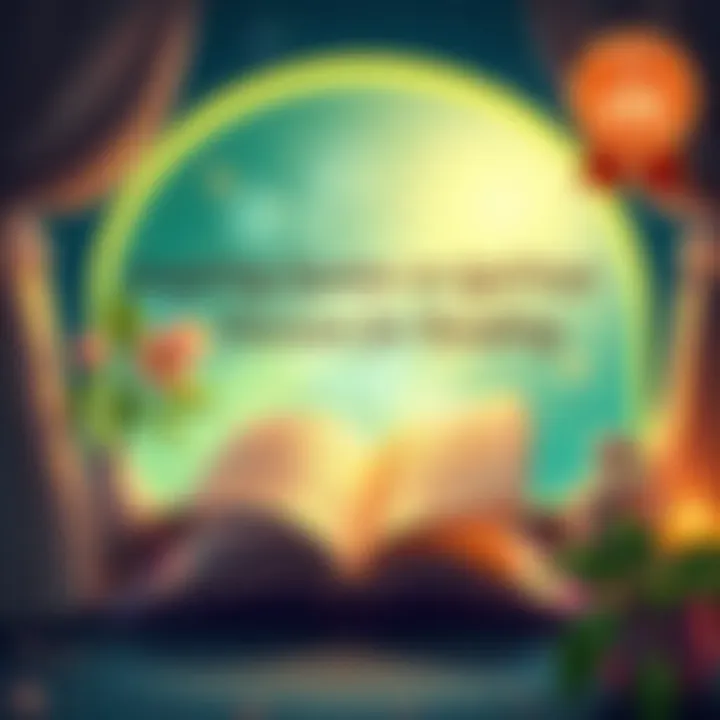Inspiring Quotes to Ignite Your Passion for Reading


Intro
In a world overflowing with distractions, the importance of reading often goes overlooked. Many don't realize that it's not just a pastime but a powerful tool for enlightenment and personal growth. Throughout history, literature has shaped minds, sparked revolutions, and transformed lives. Quotes about reading serve as gentle nudges, hinting at the profound impact that books have on our lives.
The essence of reading goes far beyond decoding words on a page; it’s about delving into different perspectives, cultivating empathy, and expanding our cognitive horizons. Motivational quotes remind us that every time we open a book, we also open ourselves to new ideas and experiences. These words, stitched together by renowned authors, philosophers, and innovators, shine a light on the transformative power of literature. As we navigate this exploration, prepare to dive into categories of life-changing books that inspire, equip, and elevate our understanding of the world.
It's easy to overlook the sheer depth that reading offers. Think of it this way: picking up a book is like stepping through a door to countless worlds. The insightful quotes we will discuss not only underscore this concept but also invigorate our determination to read more often. Whether you are a student, a busy professional, or someone who simply enjoys the feel of a novel in their hands, understanding the significance of reading quotes can bolster your resolve to cultivate a meaningful reading habit.
Let's embark on this journey of words and wisdom, diving into the categories of literature that have the power to inspire and transform. As we explore, we will unravel inspiring quotes that reflect the essence of reading and its undeniable role in personal and intellectual development.
The Power of Words
The significance of words cannot be overstated. They hold the key to communication, expression, and growth. When it comes to literature, quotes play a pivotal role in encapsulating profound thoughts, sparking curiosity and inviting readers to delve deeper into the world of knowledge. These expressions not only inspire but also challenge the mindset, offering fresh perspectives on life, success, and the human experience.
Reading quotes helps to crystallize complex ideas into digestible bits that resonate with individuals. They can act as mantras, reminders of the power that lies within reading and the transformative journeys literature can offer. It's like having a trusted friend whispering uplifting truths just when one needs to hear them. Take for instance, Maya Angelou's words: "I've learned that people will forget what you said, people will forget what you did, but people will never forget how you made them feel." Her sentiment encourages deeper emotional engagement with texts, illustrating how literature shapes both personal and societal identities.
Moreover, quotes serve as a bridge between generations and cultures. They connect readers with thinkers beyond their immediate scope, nurturing a rich tapestry of shared human experiences and lessons. This connection can be so powerful that it can spur individuals to take action, to challenge their own beliefs, or even to change the world around them. So, reflecting on the testimonials of thinkers past and present not only enriches our understanding but can ignite a very real passion for reading.
Understanding the Impact of Literature
In exploring the impact literature has on individuals, it's essential to acknowledge its role in shaping our thoughts and beliefs. Literature has this uncanny ability to mirror the complexities of society, illustrating both its beauty and its flaws. Through reading, one encounters a wide array of emotions, experiences, and ideas that might differ significantly from their own. It's in this exploration that one finds growth – both intellectual and emotional.
Consider, for instance, how timeless works such as 1984 by George Orwell or Pride and Prejudice by Jane Austen continue to spark discussions and debates. They unveil the issues of totalitarianism, social classes, and human relationships in a way that remains relevant. This relevance feeds into a reader's understanding of current events and enhances critical thinking skills, proving that literature is not just an escape, but also a catalyst for understanding the world.
In essence, the impact of literature transcends the written page; it invites readers to reflect on their own lives, instilling a sense of kinship with both characters and authors alike. These reflections can lead to a deeper connection with oneself and others, an essential element of personal development.
Literature as a Reflection of Society
Literature often serves as a lens through which we can view the societal landscapes around us. As authors pen their experiences and observations, they document the zeitgeist of their time. In this way, literature acts as both a historical artifact and a commentary on prevailing attitudes and norms.
When we engage with texts from different eras or communities, we unearth insights that highlight disparities, achievements, and struggles within humanity. This can lead to an essential realization: that many themes are universal, weaving a common thread through various cultures. For instance, Toni Morrison’s works often explore the African-American experience, shining a light on both cultural heritage and societal challenges. Through her narratives, she reminds us that literature can spur dialogue about race, identity, and belonging – issues that are still very much at the fore today.
Furthermore, engaging with literature that reflects societal realities fosters empathy, allowing readers to step into the shoes of others. This empathetic engagement can be a powerful motivator for change, encouraging individuals to confront injustices and advocate for a better world.
"Books are a uniquely portable magic." - Stephen King
This simple yet profound sentiment encapsulates the power of literature to transport us across both time and space, enabling a deeper comprehension of humanity's shared experience.
Historical Perspectives on Reading
Understanding the historical context surrounding reading reveals how deeply interwoven it is with societal development. From the earliest days when stories were shared around campfires, to the printed pages that filled libraries, literature has played a crucial role in shaping human thought. This section explores how the appreciation of reading has evolved over time, further highlighting why such perspectives are beneficial for today’s readers.
Literature isn't just about words on a page; it's a lens through which we can understand human nature, societal norms, and cultural transformations. Recognizing the historical significance of reading allows us to see the foundation of our modern literary landscapes, providing insights that may simply escape our attention in present-day discussions.
Classic Quotes from Renowned Authors
Quote compilations often serve as treasures of wisdom from those who have walked down this winding road of literature before us. Renowned authors have spoken on the importance of reading, each reflecting a different facet of its impact.
For instance, Mark Twain once said, "The man who does not read has no advantage over the man who cannot read." This highlights not only the value of reading in personal development but also emphasizes that equal opportunities come from being well-read. Such statements challenge readers to embrace reading as a necessary part of intellectual growth and enriches the narrative around education.


Another compelling mention comes from Virginia Woolf, who wrote, "For most of history, Anonymous was a woman." This quote serves as a reminder that historical perspectives on reading are also tied to gender, opening up discussions about who is included in the literary canon and how diverse voices can emerge through the written word.
A list of some notable quotes includes:
- “A reader lives a thousand lives before he dies. The man who never reads lives only one.” – George R.R. Martin
- “Books are a refuge from the world.” – E.M. Forster
- “I have always imagined that Paradise will be a sort of library.” – Jorge Luis Borges
These words provoke thought and motivate individuals to engage with literature more meaningfully.
Influence of Literary Movements
Literary movements have not only transformed writing styles but have also mirrored the ideals and struggles of their times. The Romantic movement, for instance, celebrated individual experience and emotion, which directly led to a surge in appreciation for the personal side of literature. On the flip side, the Realism movement sought to present life as it was, pushing readers to confront realities rather than indulge in fantasy.
Some notable movements include:
- The Enlightenment: Elevated reason and individualism, influencing readers to seek knowledge.
- Modernism: Questioned traditional narratives, giving rise to innovative literary techniques.
- Post-Colonialism: Aimed to amplify voices from previously marginalized cultures, reshaping the reading landscape.
Recognizing these influences helps readers to appreciate how reading is not static; rather, it is an evolving dialogue that resonates through different epochs, constantly inspiring new perspectives. By understanding the historical currents that have shaped literature, readers are empowered to see how they can contribute to this ongoing narrative.
Contemporary Voice
In our fast-paced modern world, where information flows like a river, it's vital to understand the unique contemporary voice in literature. This aspect doesn't just reflect current trends but serves as a mirror to society’s thoughts, moods, and aspirations. The contemporary voice highlights themes inherent in today’s experience, making literature incredibly relevant. It’s essential in this article as it provides a platform for the next generation of readers and writers to find their footing and expression amid evolving cultural landscapes.
Modern Authors and Their Insights
Modern authors breathe life into their narratives by addressing contemporary issues, from social justice to mental health. Their insights cultivate a reader's critical thinking and foster a deeper understanding of the human experience. Writers like Chimamanda Ngozi Adichie and Ta-Nehisi Coates challenge readers to reflect on their own beliefs while prompting discussions that ripple out into society.
Consider a quote from Adichie:
"We teach girls to shrink themselves, to make themselves smaller. We say to girls: ‘You can have ambition, but not too much. Otherwise, you will threaten the man.’”
This kind of statement drives home the point that literature can act as a catalyst for change. It pushes individuals to rethink norms and to engage with their realities in a more profound manner. Authors today share not just stories; they share movements, hopes, inciting a desire to read deep into their messages.
Cultural Trends in Reading
Reading habits have evolved remarkably over the years, heavily influenced by the integration of digital technology. The rise of e-readers, audiobooks, and online platforms shifts how we perceive reading. Audiobooks are becoming increasingly popular, making literature accessible on the go, resonating particularly with younger audiences who multitask. In this way, the cultural trends in reading are reflective of a need for convenience as well as expanding comprehension.
Additionally, there’s a growing trend of social reading communities on platforms like Facebook and Reddit. Here, book lovers share thoughts, quotes, and insights, promoting a culture of exchange. These spaces not only enhance the experience of reading but also build a sense of belonging among individuals with shared interests.
Ultimately, the contemporary voice reminds us that reading is not a passive activity. It’s an act that can inspire change and foster connection, bridging differences through shared literature.
Quotes as Catalysts for Change
Quotes hold tremendous power. They serve as mirrors reflecting our inner thoughts and aspirations, but often, they're also the sparks that ignite change. Readers encounter moments where a string of words suddenly resonates, sometimes more than a lengthy essay. In this swiftly changing world, the economy of ideas found in quotes can motivate, inspire, and provoke reflection. Embracing the right quote can navigate the tumultuous waters of personal development. Essentially, they act as shortcuts to wisdom, encapsulating complex ideas into bite-sized nuggets that we can digest without strenuous effort.
Inspiration from Within
Drawing motivation from within requires a deep understanding of oneself. Quotes play a critical role in this process. They remind us of our values and aspirations; they force us to pause and reflect. Consider, for example, Maya Angelou's brilliant lines, "You will face many defeats in your life, but never let yourself be defeated." This isn't just poetry—it's a clarion call. A quote like this can serve as a gentle push, urging individuals to assess their resilience and determination.
Every word we read has the potential to awaken our passions or highlight areas needing improvement. When individuals embrace quotes that resonate with their core beliefs, they stimulate an inner dialogue that fosters understanding and growth. In a world where chaos reigns, having a touchstone of inspiration can anchor one's intent and clarify their objectives.


"The greatest glory in living lies not in never falling, but in rising every time we fall." — Nelson Mandela
This sentiment reveals the transformational nature of quotes. When taken to heart, they empower us by aligning our inner aspirations with outward actions, fostering an atmosphere of self-improvement.
Fostering a Growth Mindset
A growth mindset is essential for anyone wanting to expand their potential. This term, made popular by psychologist Carol Dweck, refers to the belief that abilities and intelligence can be developed through dedication and hard work. In cultivating such a mindset, quotes can serve as invaluable tools for affirming this belief. They remind us that effort and persistence are as important as innate talents.
Consider the wisdom from Albert Einstein, who stated, "A person who never made a mistake never tried anything new." Rather than viewing mistakes as failures, this perspective encourages individuals to see them as stepping stones on their path to success.
- Quotes create mental frameworks: By embedding these powerful phrases in our daily routines, we can constantly recalibrate our thinking processes.
- They enhance self-reflection: Regularly encountering insightful quotes encourages individuals to examine their progress and adjust their approaches.
Reading and Personal Development
Reading isn't just a pastime; it serves as a critical gateway to personal growth and development. The act of immersing oneself in literature nurtures the mind and broadens horizons, establishing a crucial bridge between knowledge and self-awareness. The interplay between reading and personal development is multifaceted, encompassing various aspects such as mindfulness, emotional intelligence, and the cultivation of critical thinking.
Through engaging with diverse texts, individuals cultivate a more profound understanding of themselves and the world around them. Whether it's delving into fiction that mirrors one’s own experiences or reading non-fiction that challenges preconceived notions, literature invites readers to grapple with ideas, concepts, and emotions that may be foreign to them. This practice encourages introspection and constructive self-criticism, acting as a mirror reflecting one's values and beliefs.
The Connection Between Reading and Mindfulness
Reading has an inherent ability to ground individuals in the present moment. By actively engaging with a text, a reader is thrust into a world that requires their full attention. This immersion is akin to meditation, as it removes distractions and seamlessly connects the reader to their thoughts, feelings, and reactions. In essence, reading encourages mindfulness, a practice often linked with enhanced focus and self-regulation.
Practicing mindfulness through reading involves more than merely grasping the storyline; it means digesting and reflecting on each sentence. A few techniques to harness this connection might include:
- Selective Reading: Choose texts that resonate emotionally or intellectually, allowing personal connection.
- Journaling Responses: Engage in writing reflections or reactions after reading a chapter or passage.
- Discussion with Others: Exchange insights in book clubs or forums, thus enriching the understanding of different perspectives.
Woven into these practices is the fundamental idea that mindfulness gained through reading extends beyond the page. It fosters patience, promotes emotional regulation, and empowers individuals to tackle stressors more adeptly. As readers focus on the narrative, they simultaneously develop sharper observational skills and emotional sensitivity.
"Books are a uniquely portable magic." — Stephen King
Reading as a Tool for Emotional Intelligence
Another significant benefit of reading is its capacity to enhance emotional intelligence (EI). Emotional intelligence encompasses the ability to recognize, understand, and manage one’s own emotions, as well as those of others. Through the lens of literature, readers encounter characters with varied emotional landscapes. This exploration provides rich opportunities to identify with diverse feelings and scenarios, fostering empathy.
For instance, when readers become attuned to a character's struggle or triumph, they inadvertently practice empathy. They learn to perceive emotions not just intellectually, but viscerally. This experience strengthens the ability to navigate real-world interactions with heightened emotional awareness. Key aspects of using reading as a pathway to improving emotional intelligence includes:
- Character Analysis: Analyzing character choices and emotional responses cultivates critical thinking about motives and perspectives.
- Development of Vocabulary: Encountering varied emotional expressions in literature enriches one’s ability to articulate feelings and reactions.
- Real-Life Application: Applying lessons learned from characters' emotional journeys to one’s own life can lead to better conflict resolution and stronger relationships.
Ultimately, the readings we indulge in harbor the potential to shape our emotional landscapes. They challenge us to step outside our shoes and walk in those of others, a crucial aspect of emotional intelligence that can drastically improve interpersonal relations and self-understanding. The integration of these insights into daily life serves not only to bolster personal growth but also enriches one’s social environment.
Practical Applications of Reading Quotes
Reading quotes serve more than an aesthetic purpose; they act as beacons of inspiration and guidance through the tumultuous seas of life. Quotes about reading can illuminate the hidden corners of one’s mind, revealing paths towards personal growth and reflective thought. By incorporating insightful phrases into our daily lives, the influence of literature transcends the pages of books and spills into the everyday.
Integrating Quotes into Daily Life
To weave quotes into the fabric of daily life requires a little creativity and intentionality. Here are some practical ways to do this:


- Start the Day with a Quote: Placing a thought-provoking quote on your bedside table can prompt reflection each morning, setting a mindful tone for the day. Consider opting for quotes that resonate with your personal goals or aspirations.
- Mirror Affirmations: Write a favorite quote on a sticky note and place it on your bathroom mirror. Every time you catch a glimpse in the morning glow, you’ll be reminded of the power of literature to elevate your thoughts and mood.
- Social Media Sharing: Use platforms like Reddit or Facebook to share quotes that inspire you. This has the dual benefit of reinforcing your connection to literature while encouraging dialogue among your peers, potentially sparking a discussion about reading.
“A quote can ignite a fire in someone who once stood in darkness.”
- Quote Jar: Create a quote jar where each day you or family members drop in a note with an inspiring quote. Over time, this jar becomes a treasure trove of motivation that can provide solace or inspiration when needed.
Using Quotes for Motivation and Reflection
Quotes possess the incredible ability to motivate and guide us during both trials and triumphs. Here are several aspects to consider:
- Catalysts for Change: When facing challenges, reading a well-chosen quote can shift your perspective. For instance, a quote from Maya Angelou can uplift spirits, providing the push to persevere when the going gets tough.
- Reflective Practice: Allocate moments of your day—perhaps during lunch breaks or while unwinding—to reflect on a quote that struck a chord with you. This not only fosters mindfulness but also serves as an anchor in turbulent times.
- Aligning with Values: Delve into quotes that resonate with your core values. This can fortify your actions with purpose and clarity, creating a framework that guides decisions in both personal and professional realms.
By actively engaging with quotes in these ways, the profound wisdom of great thinkers can reshape our daily experiences, enriching the journey of personal and intellectual growth. The beauty of quotes lies not just in their eloquence but in their capability of prompting us to think deeply and reflectively about our lives.
Innovative Ways to Engage with Literature
Engaging with literature is not just a passive exercise of flipping through pages. Instead, it can be a transformative experience that fosters connection, understanding, and personal growth. In an age where distractions abound, finding innovative ways to engage with books and texts is crucial. Such methods not only enhance the reading experience but also promote a deeper appreciation of literature's potent role in our lives.
Through various approaches, readers can discover new facets of literature that resonate with their own experiences. Whether this involves communal discussions or leveraging the digital realm, the ways one interacts with literature can ignite passion and foster a sense of belonging.
Book Clubs and Literary Communities
Joining a book club is akin to finding a family of like-minded individuals. These clubs are often less about simple gatherings and more about cultivating a culture of shared insights and diverse perspectives. They provide a platform where readers can exchange thoughts about plots, characters, and themes while also exploring how these elements reflect personal views or societal issues.
Consider the following benefits of being part of a book club:
- Diverse Perspectives: Each member brings a unique viewpoint, which can lead to enriched discussions.
- Social Connections: Making friends with fellow readers adds a social layer to the solitary act of reading.
- Expanded Reading Horizons: Clubs often select books outside of members’ comfort zones, which can introduce fresh genres and authors.
- Motivation to Read: Having set discussions and deadlines motivates members to finish books they may otherwise set aside.
"Literature is the best medicine for the soul, much like the company of good friends who challenge your perspectives."
These communities can form physically or online, making them accessible to many. Platforms like Reddit offer various subreddits dedicated to book lovers, such as r/books, where readers share recommendations, insights, and discuss literary themes in depth.
Digital Platforms for Reading Inspiration
As we move further into the digital age, online platforms have reshaped how we consume literature. Websites like Goodreads allow readers to track their reading journeys, share reviews, and connect with friends over their favorite books. This not only enhances personal engagement with texts but also encourages community dialogue around them.
Additionally, technology offers countless resources to inspire readers. Through podcasts, webinars, and social media, literature becomes a living, breathing entity that evolves beyond the printed page. Here are some notable resources to explore:
- Podcasts like "The New Yorker: Fiction" provide insightful discussions with authors.
- YouTube channels such as "Epic Reads" engage young adults with lively book trailers and recommendations.
- Social media platforms like Instagram and TikTok have fostered the book influencer culture, allowing for dynamic engagement with literature as trends unfold.
These methods not only invigorate individual reading practices but also cultivate a communal love for literature in the digital landscape, broadening the scope of what reading can entail.
In summary, innovative ways to engage with literature—through book clubs and digital platforms—offer rich pathways for readers. These engagements help individuals build community, broaden their literary horizons, and stay motivated in their reading endeavors.
The Future of Reading
In the fast-paced world we live in, reading often seems like a luxury rather than a necessity. Yet, its importance is only becoming more apparent as we navigate an era where information overload can overshadow genuine learning experiences. The future of reading is not merely about choosing between books or screens; rather, it revolves around adapting to how we consume literature while ensuring we do not lose the essence of thoughtful engagement with texts.
The emergence of new reading habits will shape how both casual readers and committed bibliophiles approach literature. We are witnessing a shift from traditional forms towards more innovative modalities, influenced heavily by technology and societal changes.
Emerging Trends in Reading Habits
Gone are the days when reading habits stayed static over generations. Today's readers are more discerning, often multitasking with several activities while trying to squeeze in their literary engagements. Some emerging trends highlight this evolution:
- Micro-reading: Short articles, social media posts, and snippets of text greatly influence not how much one reads but how often. Readers can digest information in small bits, promoting quick-thinking and immediate engagement without a deep dive.
- Audiobooks and Podcasts: There’s a significant rise in auditory literature consumption. Many find that listening to stories or discussions helps in sinking ideas in a way that reading a printed page may not accomplish. This trend resonates especially with busy individuals, where ‘reading’ transforms into an auditory experience without sacrificing time.
- Interactive Literature: Digital platforms are crafting experiences where readers become part of the narrative. This interactivity engages them in a way that traditional reading cannot. The rise of Choose Your Own Adventure or immersive storytelling through gaming has become a focal point for younger audiences.















